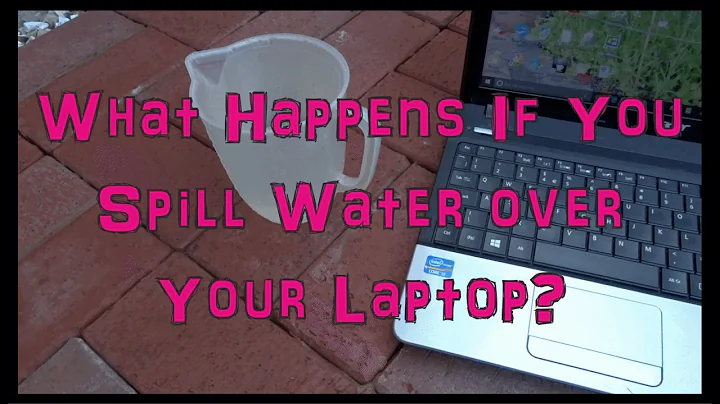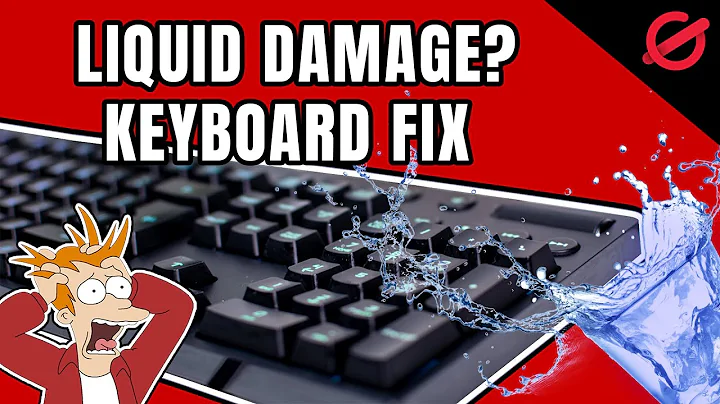Can spilling a liquid on a keyboard or other input device connected to a desktop computer damage the computer itself?
Solution 1
It is possible, but it does not usually happen. A full short at a USB or PS2 ports would mostly effect the 5V signal, possibly damaging the port itself. But isolation just due to the layers of components in there usually keeps a full short from damaging back further than the port itself.
A crossup of the 5v to the serial lines data entry really would not be a big issue, as the components wouldn't have a big problem taking the higher voltage for a while at the input, so usually once recovered the data will then again be recognised if the device is still powered.
It would so totally depend on the computer build itself and the conductivity of the liquids. I guarantee that a motherboard could be made so poorly that it would.
Now with the new USB3 specs and its higher power, the possibilities become more endless http://www.everythingusb.com/superspeed-usb.html
Remember that in many cases, pulling the keyboard, and putting in another, can require a restart or power off, so if your trying another keyboard, after messing up the one you were using, shut the computer off, put in other keyboard, then turn back on.
Solution 2
Most specifications don't require protection against shorts, but most devices have them anyway. The USB specification requires full protection in the host or hub against damage from shorts. Two caveats:
This only applies specifically to USB. For other standards, some have such protection (RS232, eSATA) and some don't (PS/2 keyboard).
There are a few stories where people swear a short damaged their hardware. This could be due to devices that don't comply with the specification or it could be due to devices that were already fairly broken and would have failed anyway. As far as I know, there are no controlled studies.
Solution 3
On a modern computer with a USB-connected keyboard, or even with the old PC/PS2 keyboards, it's exceedingly unlikely that spilling a beverage on a keyboard would damage anything other than the keyboard. (If it were likely I would have done it several times.)
You very likely will damage the keyboard itself, of course, and, in particular, carbonated beverages are bad, as are beverages containing sugar or cream. Plain black coffee is not quite as bad, and plain water probably won't cause serious permanent damage once the keyboard has dried out for several days. (It takes a minimum of 3-4 days for a keyboard to dry after getting wet, and sometimes a week or so.)
If you spill a carbonated beverage on a keyboard the only way to rescue it is to immediately disassemble the keyboard as much as possible and rinse the keyboard "innards" well with 2-3 changes of distilled water. Then set it up leaning against something (so the water will run out) to dry for a week or so.
Mice are probably even less likely to transmit damaging surges. The biggest danger would be with devices that have separate power supplies attached, but even there the USB port itself is well-protected, so damage would be unusual.
The only times (twice in in 40-odd years) I've ever seen external surges damage a computer it was due to lightning strikes to ethernet or phone cables.
Solution 4
It can... If you short the voltage lines back to the motherboard then you could end up damaging the port that you are plugged into. It applies to anything wired to your computer and especially if it takes power from the port.
Solution 5
Not likely, but it depends. Most usb devices run on fairly low voltage and current and arn't likely to do much damage - a powered device might have a short between say, its 12V 1A power source and the 5V 5ma USB connector, but with an unpowered device its probably not going to be enough power to damage anything.
I would note that a PS/2 keyboard might potentially be a little more 'interesting' since they can turn on a system, but even thenthe same low power requirements makes it unlikely
Related videos on Youtube
bwDraco
I'm a computer and tech enthusiast with a variety of interests ranging from video games to fountain pens. I stand behind everything I post here. If you find any problems with my posts, feel free to leave comments, edit them, or let me know in chat if you have any questions or concerns. If you're curious about my answering style, it's inspired by the answers posted by Thaddeus Howze ♦ at Science Fiction & Fantasy. This chat transcript details why I made this change. I'm also one of the resident spam fighters on Super User and can catch spam others miss. If you suspect that one or more posts are spam, bring it up in the Ask a Super User Moderator chat room, and be sure to ping me—I'm around most of the time. Don't forget to flag blatant spam—it takes just six spam flags from the community to delete it. It sounds like flagging posts as spam isn't enough; they need to be flagged specifically to your attention (and what are the odds that you haven't already found it). —fixer1234 (source) If you're wondering about my name, it used to be DragonLord, but I've had to change it due to a bizarre trademark dispute. Feel free to call me Draco or by my real first name Brian. As an aside, I'm a bit of a photo enthusiast. I shoot with Pentax eqiuipment, and you can find me on Pentax Forums.
Updated on September 18, 2022Comments
-
bwDraco over 1 year
I've heard that spilling liquid on the (wired) keyboard of a desktop computer can cause damage to the motherboard or other parts. Is this possible, or will only the keyboard be damaged? How does this apply to other input devices such as mice, assuming that they are wired?
-
Nedudi over 12 yearsSometimes, this lack of protection is semi-intentional. Some USB2 devices try to draw more power than the USB2 standard says they're allowed. This is particularly common with external hard drives (the laptop-drive-in-an-enclosure style ones). Many USB2 ports allow them to get away with it. An old laptop of mine allows it, but warns of a power surge. It's extremely unlikely that even the cheapest of PCs will die from plugging in a working hard drive - the "surge" isn't that big. But I wouldn't be surprised if some cheap systems support these drives by skimping on the surge protection.
-
Wyzard about 12 yearsI've seen a machine's PS/2 port damaged by a beverage spilled on the keyboard. Had to replace the keyboard with a USB one.




